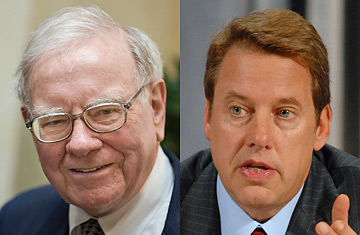
In a recent study, college students were asked to rate headshots of the CEOs of 50 Fortune 1000 companies. Based on measures like competence and trustworthiness — and with no prior knowledge of the executives —study participants could distinguish between the successful (Warren Buffett, left) and less successful (Bill Ford, right) CEOs.
A first impression can count for a lot. For a company's CEO, it may even predict his firm's success. Top executives who appear powerful and leaderlike at first glance are more likely to run profitable companies, according to a study by Tufts University psychologists published in the February issue of Psychological Science. By contrast, CEOs who seem likeable or trustworthy have no leg up.
The researchers showed 100 study participants black-and-white headshots of 50 Fortune 1,000 CEOs — a fairly homogeneous-looking group almost entirely made up of middle-aged white men — then asked the volunteers to rate the executives on personality traits, and how well they thought the person would lead a company. The study controlled for the CEOs' age, emotional expression and attractiveness (it's well-known that people tend to assign positive traits to the good-looking), and threw out data from participants who recognized any of the executives.
CEOs who scored high on measures of power — competence, dominance and facial maturity — and on a measure of leadership were in many cases the ones who ran companies with the biggest overall profits. (The study looked at profit, not profit margin, but controlled for firm size.) On the other hand, executives who were rated highly on measures of warmth, such as likeability and trustworthiness, didn’t necessarily match up with successful companies. Boards of directors take note: "There's no relationship between how trustworthy a person seems and how well the company does," says Nicholas Rule, a doctoral candidate and one of the study's co-authors. "Warmth isn't correlated with success. Power is."
Just because two things go hand in hand, though, doesn't mean that one is causing the other. Nalini Ambady, a Tufts professor and the study's other author, explains: "What's not clear is whether people pick CEOs because they look a certain way, or if people look a certain way once they become CEOs."
The study also didn't ask participants why they thought one CEO looked more competent or trustworthy than another. The judgments being measured were happening more on a gut level. In that way, the experiment lends support to a growing argument among psychologists who study decision-making that when people come to quick conclusions without much information, their decisions are often good ones. Though previous research examining perceived CEO personality and firm performance found few links between the two, Ambady and Rule point out that those studies relied on surveys of people who knew the executives. In the new paper, the authors write, "These finding suggest that naïve judgments may provide more accurate assessments of individuals than well-informed judgments can."
